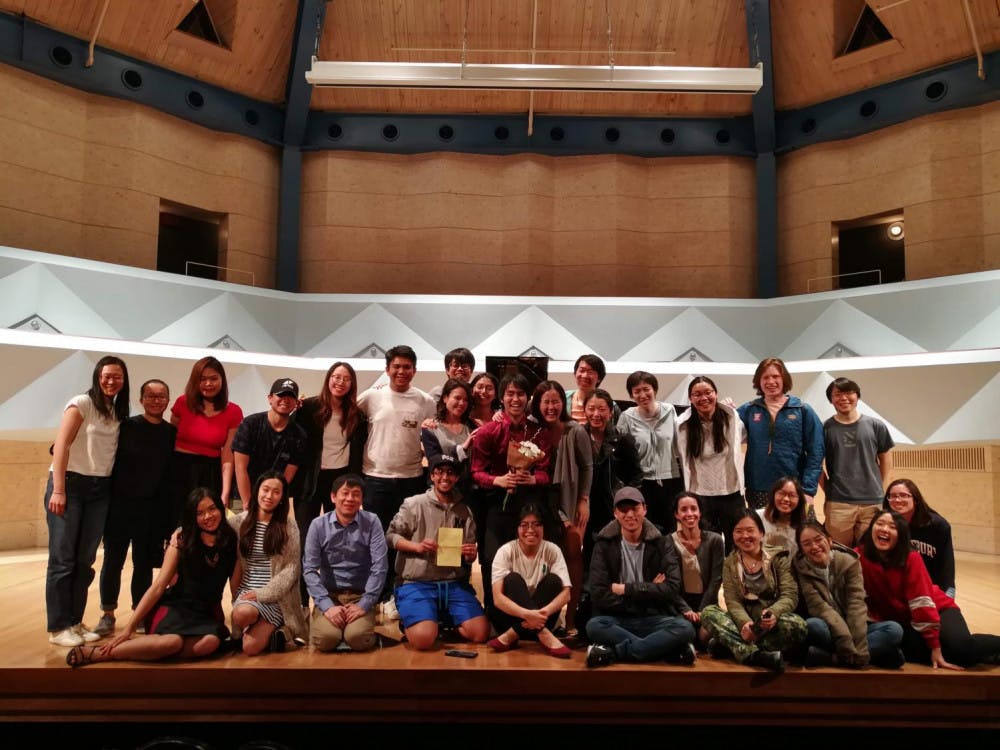Junya Iwata ’19 plays badminton and studies psychology. He is not sure about his post-college plans yet. To an extent, he is an ordinary Middlebury student.
But when Iwata plays Chopin, the angels sing over Vermont.
Iwata’s senior piano recital, “The Finale,” took place in the Robison Concert Hall at the Mahaney Center for the Arts on the evening of Saturday, April 13 from 8-9 p.m. A crowd of almost 70 friends and community members came to see the performance.
Sporting a crimson shirt and black slacks, Iwata took the stage to much applause. The pianist then sat down and began with “Ballade, L. 70” by Claude Debussy (1862-1918).
Playing impressionist music, and in particular Debussy, is sometimes tricky. There are swarms of enigmatic pedal schemes and painstaking dynamics to deal with, as well as digitally demanding key signatures and scales. A piece like “Ballade, L. 70” can be quite tricky.
Iwata dominated the piece. He allowed the melody to sing clearly but also brought out the underlying jazziness of Debussy that would go on to influence Bill Evans. Iwata, a psychology major also explored the intellectual complexity of Debussy’s music.
“I get so much into music that I lose thought about the real world,” mused Iwata. “The more artistic a piece is, the more it can give me a different worldview.”
Next up was the “Piano Sonata in A Major, D. 664” by the Austrian composer Franz Schubert (1797-1828). The energy Iwata used for Debussy’s clarity was reassigned to a Romantic whirlwind of grand scales, mountainous runs and daring chords. Iwata so effectively channeled the Austrian energy of Schubert’s music that one would not have been entirely surprised if mid-performance Maria Von Trapp jumped out of the piano’s soundboard, making happy circles around Robison Hall.
Things took a bleak (but beautiful) turn when Iwata played the second movement of the “Sonata.”
“I feel myself the most unfortunate, the most miserable being in the world,” wrote Schubert in March 1825 after a bout of a venereal disease. One could hear the composer’s underlying sadness when Iwata played the second movement. Even the sections that paid homage to church hymnals seemed a little mournful.
Towards the middle of the Schubert Sonata, it became clear that “The Finale” was the work of a pianistic mastermind. One might have reasonably wondered, “How did Iwata become so good?”
Middlebury College Affiliate Artist Diana Fanning, Iwata’s piano instructor, has some answers.
[pullquote speaker="" photo="" align="center" background="on" border="all" shadow="on"]Iwata calmly pulled five double-handed scales during this six-minute whirlwind of mischief, cooly complementing loud block chords with small, pavane-esque trills.[/pullquote]
“Junya is a very talented and serious musician,” she said. “However, music is a life-long study and there is always more to learn. A famous piano pedagogue once said that teachers are links in a chain of centuries of musical understanding.”
The final movement of the “Sonata”, an Allegro, went back to the first movement’s levity but ramped up the pyrotechnics. Iwata calmly pulled five double-handed scales during this six-minute whirlwind of mischief, cooly complementing loud block chords with small, pavane-esque trills. Night may have fallen on the Mahaney Arts Center when Iwata finished the concert’s first half, but the “Sonata” left Robison Hall bright and sunny for the five-minute intermission.
Vincent Falardeau ’22 was impressed by the recital’s first half. “I feel like all the keys sang together in perfection.”
After the intermission, Iwata came out and played “Polonaise-Fantaisie in A-flat Major, Op. 61” by Frédéric Chopin (1810-1849).
Chopin has always been an influence on Iwata. One of his earliest memories is of his mother playing the composer’s “Minute Waltz,”. Later, Chopin would become the most popular composer in Iwata’s repertoire.
“The way [Vladimir] Ashkenazy plays resembles most the way I play Chopin,” said Iwata. “[Artur] Rubinstein is too harsh.”
The above is critical in dissecting Iwata’s artistry. A Rubinstein interpretation of the Polonaise-Fantaisie would have been pinpoint accurate, but perhaps a tad icy (“too harsh”). The pianist instead paid homage to Ashkenazy by using a bolder, more epic dynamic range. Iwata played a work written for just the solo piano, but he executed it like he was conducting the Vienna Philharmonic. This “go-big-or-go-home” interpretation of Chopin worked brilliantly. “[The Polonaise-Fantaisie] was very somber, but throughout the piece you heard light,” reflected Claire Moy ’22.
Moy’s analysis was dead on. The Polonaise-Fantaisie constantly fluxed from pastoral joie de vivre to downright Armageddon — one moment things were George Eliot; the next, T.S. Eliot. Iwata played the last lines with unbridled passion, his quick fingers spiraling across the keyboard.
After the Chopin, a standing ovation lauded Iwata.
“Phenomenal!” roared Allan Lei ’21. An encore ended the evening with a dash of jazz: the pianist chose Prelude No. 1 in B-flat Major by George Gershwin (1898-1937). In under three minutes, Iwata’s playing transported the rural Vermont audience to a 1920s Manhattan teeming with car horns, traffic lights and skyscrapers.
Middlebury resident Steve Butterfield left Iwata’s recital with a grin on his face: “You know how great the weather was today? The concert was just as great.”
A Piano Mastermind’s College ‘Finale’

Comments



